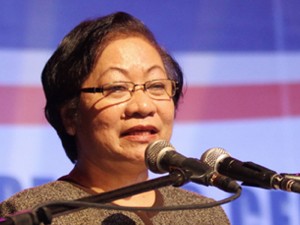The Philippine Overseas Employment Administration (POEA) will study a proposal by the Department of Foreign Affairs (DFA) to defer enforcement of a ban on the deployment of Filipinos to 41 countries deemed as not providing enough protection to foreign workers.
The POEA governing board, chaired by Labor Secretary Rosalinda Baldoz, initially met on Friday to deliberate on the DFA proposal seeking postponement of the implementation of POEA Governing Board Resolution No. 7.
POEA Administrator Carlos Cao, board vice chair, told reporters that the resolution ordering the ban was to take effect on November 18, or 15 days after its publication
“Resolution 7 does not take effect until after 15 days and we will take advantage of this. We believe this will give us ample time to discuss the matter thoroughly and extensively on whether to defer or not,” Cao said.
Cao earlier defended the ban, saying that the agency was only complying with the provisions of Republic Act No. 10022, which restricts the deployment of overseas Filipino workers to countries duly certified by the DFA as having adequate protection for migrant workers.
However, former ambassador to the United Arab Emirates Raul Señeres said the certification provisions of RA 10022 should be repealed by Congress as soon as possible because they are difficult to implement.
“The law will be unimplementable in the long run. The hiring of migrant workers in labor-receiving countries is a lucrative and flourishing business dominated by foreign manpower companies. Nothing can prevent a manpower company based in an unbanned country such as Saudi Arabia from recruiting workers from the Philippines purportedly or on paper, to work in Saudi Arabia but their actual destinations are somewhere else, such as banned Afghanistan,” Señeres said.
He added, “Also, what will prevent an employer in the United Arab Emirates who has 10 Filipino housemaids from bringing five of them to Iraq to work in the household of his relatives there? Stamping the OFWs’ passports with a notice that travel to, say, Lebanon, is restricted is obligatory only on the part of Philippine immigration officials and not on the part of the other countries’ immigration officers.”
Señeres said the Philippine government should instead deploy diplomats determined to fight for the rights of OFWs wherever they might be.
“The best thing to do is to send ambassadors who are briefed to truly fight for every Filipino worker’s rights like a Doberman, not a poodle. They should send a strong signal to employers of OFWs that they should not mess around with an OFW. They should not be afraid of being declared persona non grata for fighting at all costs for an OFW,” he said.
After all, he added, the Migrant Workers Act directs that the “top priority concern of the secretary of foreign affairs and the Philippine ambassadors is the protection of OFWs.”
